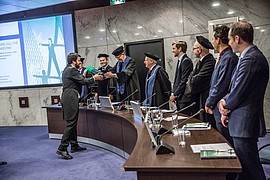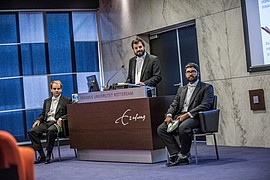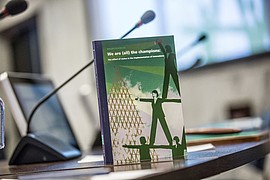PhD Defence: Balazs Szatmari

In his dissertation ‘We Are (All) The Champions: The Effect of Status in the Implementation of Innovations’ ERIM’s Balazs Szatmari explores the effects of status in the implementation of innovations in three empirical papers which investigate both the positive and negative impact of status –status of either the project leader, the project group, or the organization.
Balazs defended his dissertation in the Senate Hall at Erasmus University Rotterdam on Friday, 16 December 2016 at 09:30. His supervisor was Prof. Jan van den Ende and his co-supervisor was Dr Dirk Deichmann. Other members of the Doctoral Committee were Dr Daan Stam (Erasmus University), Prof. Andrea Prencipe (LUISS University), and Prof. Brayden King (Northwestern University)
About Balazs Szatmari

Balazs Szatmari was born in Miskolc, Hungary, in 1988. He obtained his Bachelor’s degree in Business Administration and Management from Corvinus University of Budapest in 2010. During his undergraduate studies, Balazs was actively involved in voluntary work aimed at teaching Mathematics, Statistics, and History to financially disadvantaged students. In addition, he spent one semester on exchange at the University of Liège in Belgium with a scholarship. After gaining some industry experience at a major multinational publishing company, he moved to the Netherlands, where he was engaged in managing a start-up for a year and obtained his Master’s degree in Management of Innovation from Rotterdam School of Management in 2012. Right after his graduation, he joined RSM’s Technology and Operations Management Department as a PhD candidate. During his PhD studies, Balazs spent a research semester at Northwestern University in 2016.
Balazs’s main research interest is in the role of status in uncertain activities. More specifically, he focuses on the dynamics and biasing effects of status hierarchies in the implementation of innovations. He has presented his research at various international conferences and his papers are currently under review at top-tier journals. Besides research, Balazs has taught on several courses on the topics of innovation management and social networks. He also has mentored dozens of Master and Bachelor students in the completion of their thesis projects. Currently, Balazs is an assistant professor in the Entrepreneurship and Innovation Group at the University of Amsterdam, the Netherlands.
Thesis Abstract

This thesis explores the effects of status in the implementation of innovations in three empirical papers which investigate both the positive and negative impact of status –status of either the project leader, the project group, or the organization. We argue that every project member fulfills the role of champion in their project through their status. By analyzing a unique database of video game development projects compiled from three different sources, we uncover several important effects of status in the creation of innovations. In addition, we study several factors which moderate the relationship between status and innovation performance.
The first two studies focus on the position of social actors in the organizational status hierarchy. While these studies show that status provides several important advantages in the innovation process, they also uncover important negative-side effects of status which are more likely to occur in more innovative settings. The third study reveals that, for the same level of quality, high-status organizations are able to realize more advantages than their low-status counterparts. However, we also show that high-status organizations fail to realize all the potential benefits of their status when they invest in projects of great magnitude.
Together, our studies provide important insights into the effects of status and the dynamics of social hierarchies in the creation of innovations. By gaining a better understanding of the social side of innovations, both researchers and practitioners will be able to form a more complete picture of the social components of organizational competitiveness.
Photos: Chris Gorzeman / Capital Images


